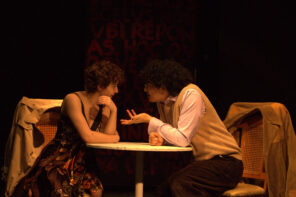Dean of Arts Christopher Manfredi, along with Associate Deans Gillian Lane-Mercier and Lucyna Lach, held a town hall on January 22nd in the Arts Lounge to explain upcoming changes in the Faculty of Arts.
While nothing has been finalized, Dean Manfredi indicated that these changes reflect objectives that have existed since the adoption of a Senate white paper in 2006: putting “researchers in the classroom” by having more large courses taught by full-time, tenure track faculty members, and increasing student access to Teaching Assistants.
The latter point was a particular concern of his, citing another Town Hall in 2010 in which students expressed dissatisfaction with availability of TAs. “For several years, TA resources have been static at a time when enrolments have been increasing and cost has gone up,” explains Dean Manfredi. “The ability for us to provide an appropriate ratio of students to TA’s has been harmed.” The savings from reducing non-tenured course lecturers was meant to be redirected towards hiring 120 new TA’s, improving the Student-TA ration from 80:1 to 60:1, though budget cuts may put that in jeopardy.
According to Dean Manfredi, of the 1194 courses offered by the Faculty in the 2011-2012 academic year, 443 (37%) had 20 or less students enrolled, and 230 (19%) had 10 or less, though he remarked that the distribution across programs was not exactly even. “If you are in one of the five largest programs, Political Science, Economics, International Development Studies, History or English, these numbers may come as a surprise to you,” he remarked.
The stated goal of reducing the number of small-enrolment courses by 100 was framed more as a housekeeping initiative than anything else. “Some courses are small by necessity. However, other courses have low enrolment because professors do not want to teach that many students, or because they are in an esoteric subject and students do not want to take them. These are the courses that worry me, and take up resources that could be put elsewhere.” Later on, he would add that he believes there are easily 100 courses in Arts that do not “add value” to the educational experience of students,
In particular, the Dean wants to redirect tenure track professors, who typically teach four courses per year, away from these sorts of courses towards larger ones, which in his view gives more students access to the strong research faculty McGill is known for. “When we tell prospective students that when they come to McGill they will be taught by leading scholars in their field, I want to be able to honour that promise by having them actually be in the same classroom,” he explains.
To this end, Dean Manfredi sent out Professor Lane-Mercier, Associate Dean, to meet with the various departments and ask them to examine their programs for inefficiencies. “The ongoing thought process is that each unit should be responsible for rethinking aspects of their programs towards reducing lower enrolment courses without endangering the programs.” She cited the example of one department in which there are multiple “special topics” courses with one or two students enrolled in each. In this case, they could be dropped and replaced by a supervised independent reading course, freeing the associated professor to teach another, larger class.
Student questions largely revolved around the benefits of small classes, fostering discussion and personal involvement, and the inverse problems inherent to large ones. Dean Manfredi acknowledged that these problems are real, though reiterated that the “good” sort of small courses should ideally remain intact, depending on the choices made by individual departments.
The Dean was perhaps less convincing in his rationality for reducing course lecturers beyond simply reprioritizing funds. While he reiterated the Faculty’s commitment to having top researchers teaching as many undergraduates as possible, he acknowledged that “in some contexts” course lecturers can be better than full-time faculty due to their higher focus on teaching. He also denied that cuts have anything to do with course lecturers unionizing, saying this move had been planned long before the union was created.
At this point, changes are still in the planning stage. More should be known following the next faculty meeting in March. In regards to course reductions, Dean Manfredi is convinced that the issue has been overblown, and that the only courses being cut are those that will not be missed. “I could have done all of this without saying a word, but I made the deliberate choice not to. How many of you count the number of courses we offer every year? The funds we save from this can also be reallocated towards internship awards and funding research internships.”








